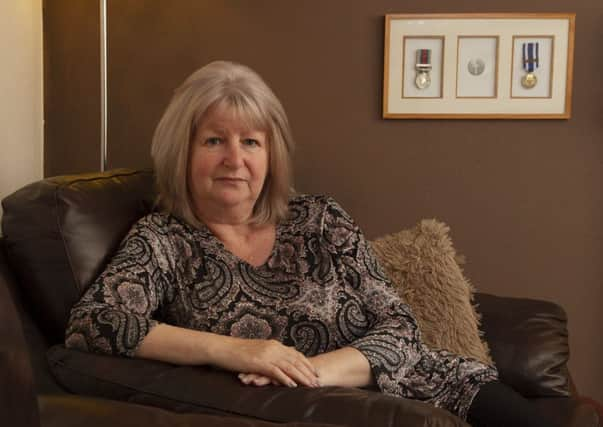PSTD failures: Mother fights for justice for her son


“Sorry for not letting you use my computer and telling you to go and use your mate’s, sorry for not doing your washing that time you asked me, sorry for not knowing what you were going through, sorry for not coming to collect you when you were on a night out, sorry for not helping you when you needed me…”
The continual torment of the bereaved who have nothing to torture themselves about, but who live with regrets every single day of their lives.
Advertisement
Hide AdAdvertisement
Hide AdTwenty-two-year old Aaron Black, a Black Watch soldier, took his own life just before Christmas in December 2011 while suffering from post traumatic stress disorder (PTSD) stemming from the horrors, including a horrific explosion in which a friend was killed, he witnessed while serving in Afghanistan.
His mother had been unaware that Aaron, who left the army seven months previously, had been diagnosed as suffering from PTSD – while in the services – until she discovered what she describes as a “watered down” version of army medical records, some marked “confidential” – in his flat following his death.
It was only later when Ms Black managed to obtain more of his army medical records that she found out he had made previous suicide attempts and “continued to have suicidal thinking” while still serving in the Black Watch after his return from Afghanistan.
“The records show Aaron was to be referred to mental health social worker at RAF Leuchars before he left the army. Aaron’s case was never followed up,” she said.
Ms Black, 61, a civil servant, said she would support calls by Johnston Press to have “veteran” recorded on veterans’ death certificates to highlight the scale of the problem.
“I don’t want any other mother to go through this,” said Ms Black, who has campaigned to get to get justice for Aaron, identifying a range of systematic failures which led her son to “fall through the net” once he left the army.
Aaron, from Rattray, Perthshire, who joined the army aged 17, had surrounded himself with his army medals, photographs, including one of himself in uniform, and a crucifix before sending his mother a last text “Goodbye XXX” and hanging himself in his flat.
Advertisement
Hide AdAdvertisement
Hide Ad“The fact that he had the crucifix there brought me some comfort,” Aaron’s mother said.
Ms Black, from Blairgowrie, was desperate to know every detail of what the police found after they went to Aaron’s flat after being alerted by a former comrade’s widow he had contacted shortly before his death.
“He had left the doors open, it must have been cold. The radio was still playing and there were cigarettes in the ash tray.” said Ms Black.
“What must he have been thinking?
• READ MORE:
“That ‘I’ve gone through all of this for my country and I’m left with nothing?’ Looking back to try to identify any clue to Aaron’s action, his mother recalls a “bluey” or electronic email the troops can send home.
“Aaron witnessed a lot in Afghanistan. The main thing I remember was him sending me an electronic bluey after the explosion and saying it was the worst time of his life and he’d tell me about it when he came home.
“But Aaron only talked about it once. He was so choked he struggled to speak.”
Ms Black went on to describe details of what Aaron said the Recovery Team had seen in the aftermath of the explosion which killed his friend but the details are too harrowing to publish.
Whilst Aaron’s military records showed he had been treated for PTSD he did not tell anyone about this after leaving the army.
Advertisement
Hide AdAdvertisement
Hide Ad“Aaron never told a soul. He wasn’t opening up. I also found out that he had tried to use his learning credits to get work. He had this dream of chasing modern-day pirates across in the sea, working for maritime security or close protection.
“But Aaron would never have openly admitted to PTSD. Why? I believe he was bothered about the stigma and just tried to keep going.
“If anyone from the mental health services had visited Aaron in those seven months they would have spotted signs he wasn’t right. He had lost a lot of weight and was looking gaunt.”
“I took my eyes off Aaron who was a young veteran who had PTSD, though I didn’t know it. It doesn’t take much to break your back when you’re suffering like that.”
Ms Black said Aaron had sought help from military charities but was up against bureaucracy and delays. A letter he sent SAFA, the military charity, on 6 November 2011 received a reply on 22 December that year – dated after he died
“To any mum I’d say ‘keep an eye on your son coming out the army’. A young lad could be leaving after doing one tour. Maybe with other tours they could be more battle-hardened.”
Aaron’s story featured in the play A Brave Face about PTSD by the Vamos theatre company at the Dundee Rep, and performed across Scotland. The play was based on Matthew Green’s ‘Aftershock’ – The Untold Story of Surviving Peace’, about PTSD and which included Aaron’s story.
Ms Black said that talking about Aaron was a “double-edged sword.”
“It takes me two or three days to come down. But if at least one vet is helped because of Aaron, then job done.”